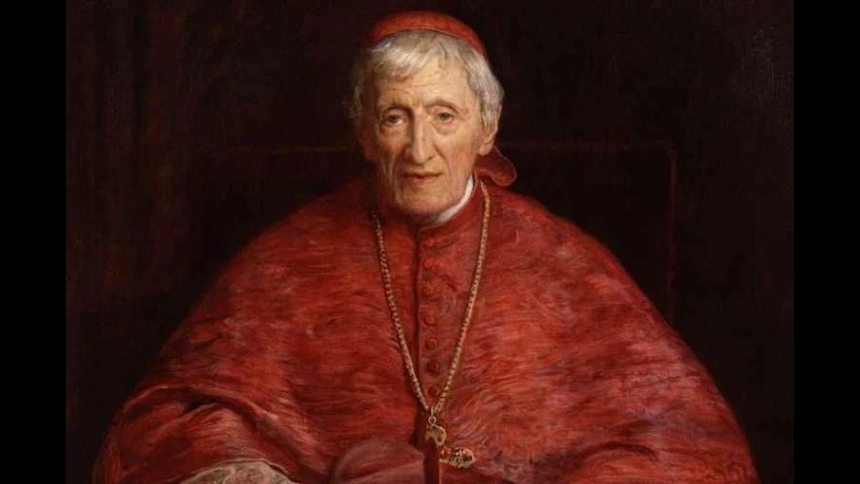
Above: St. John Henry Newman (1881). Credit: Sir John Everett Millais/Public domain
“Dogma has been the fundamental principle of my religion … Religion, as a mere sentiment, is to me a dream and a mockery.”
— St. John Henry Newman, Apologia Pro Vita Sua
A teacher for all times
Being named a Doctor of the Church is one of the highest honors the Catholic Church can bestow on a saint. The title, from the Latin doctor meaning “teacher,” recognizes those whose writings and spiritual insight have deeply shaped Christian faith across the centuries.
Doctors of the Church are not declared infallible, but their teaching is considered especially sound and enduring. They are men and women whose holiness and intellect help the Church more deeply understand and live the faith.
On All Saints Day, St. John Henry Newman will be elevated as the next Doctor of the Church.
A doctor of friendship and faith
“Newman was a doctor of friendship.” — Dr. Reinhard Huetter
Dr. Reinhard Huetter, Ph.D., a distinguished visiting professor of Catholic Theology at Duke Divinity School, has written extensively about Newman’s lasting significance for the Church and the world. Huetter, who earlier this year gave a special presentation at the Diocese of Raleigh Catholic Center for diocesan clergy and staff regarding his work on the International Theological Commission’s work commemorating the 1700th anniversary of the Council of Nicaea, was generous enough to offer some additional perspective on Newman’s becoming a Doctor of the Church.
He described Newman as a “doctor of friendship”—a man whose holiness was expressed through empathy, charity, and authentic personal relationships. Newman’s friendships spanned the worlds of clergy, laity, and students, and he carried on over 21,000 extant letters throughout his life.
His path of sanctity also involved perseverance and sacrifice. Inspired by St. Philip Neri, Newman brought the Oratory of St. Philip Neri to England, serving the poor Catholic faithful of Birmingham with devotion and humility while establishing both a parish and a school.
The principle of dogma
According to Dr. Huetter, what most deeply defines Newman’s theological vision—and why he truly merits the title of “Doctor of the Church”—is what Newman himself called “the principle of dogma.”
Newman believed that the Christian faith is not merely a feeling or private opinion, but an act of divine assent to the truths God has revealed. From his youth, he was guided by the conviction that faith must be rooted in truth, not sentiment.
Dr. Huetter explains that, for Newman, dogma consists of “supernatural truths irrevocably committed to human language—imperfect because human, but definitive and necessary because given from above.”
This conviction shaped all of Newman’s major works—from his Anglican sermons to An Essay on the Development of Christian Doctrine to his spiritual autobiography, Apologia Pro Vita Sua.
For Newman, faith is not an emotional experience or a philosophical speculation; it is the mind and heart’s response to a living God who reveals himself in history.
Newman on truth and its counterfeits
In his book John Henry Newman on Truth and Its Counterfeits: A Guide for Our Times (Catholic University of America Press, 2020), Dr. Huetter explored four key themes in Newman’s thought: conscience, faith, doctrinal development, and the university.
Conscience: Newman taught that true conscience is not personal preference, but the voice of divine law inscribed on the human heart. (Because of the centrality of conscience to Newman’s thought, some have proposed the title “Doctor of Conscience” for him.)
Faith: Genuine faith, he said, is a gift of grace—an assent to divine testimony rather than mere intellectual opinion.
Doctrinal development: Newman balanced fidelity and growth, warning against both rigid traditionalism and reckless innovation.
The university: He insisted that all branches of knowledge must remain united under God, with theology at the heart of true education.
Through these themes, Dr. Huetter presents Newman as a prophetic guide for our age—a thinker whose clarity about truth and holiness of life continue to illuminate the Church today.
Newman and the university
A “Newman Center” refers to a Catholic campus ministry at a non-Catholic university—spaces where students can gather for Mass, prayer, study, and community life. These centers are named after St. John Henry Newman, whose vision for education continues to inspire Catholic campus life.
Newman’s famous work The Idea of a University argued that higher education should unite faith and reason, forming not only the intellect but the whole person. He believed that theology belongs at the center of the university because truth itself is one—and that when faith is excluded, learning loses its deepest meaning.
Newman Centers embody that same vision today, helping students live their faith fully amid academic life. They remind us that faith and intellect, prayer and study, belong together in the search for truth.
A teacher of friendship and truth
As Dr. Huetter notes, Newman’s life and writings reflect both heroic sanctity and deep personal influence—hallmarks of every Doctor of the Church.
His unwavering faith, his friendship with others, and his conviction that truth must guide both conscience and education make St. John Henry Newman not only a Doctor of the Church, but truly a teacher for our times.

